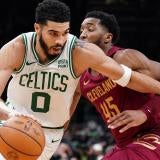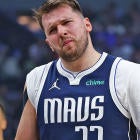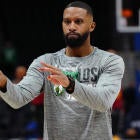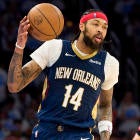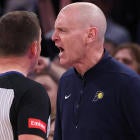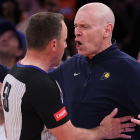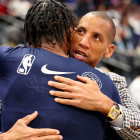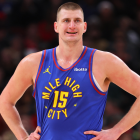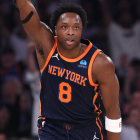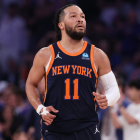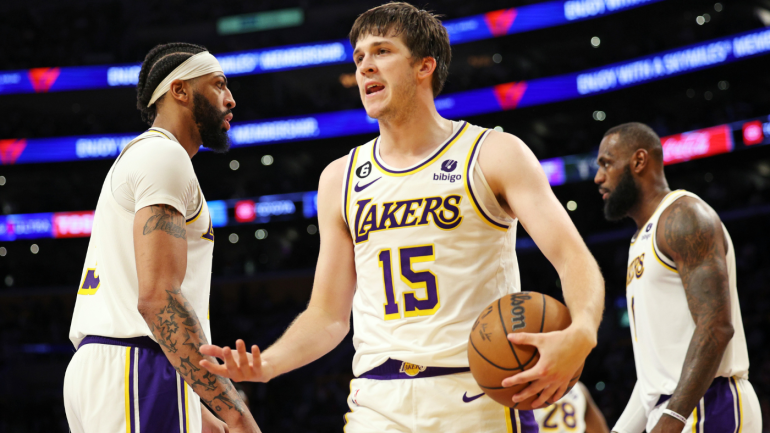
The Los Angeles Lakers have had LeBron James for five years now. In those five seasons, they've had five completely distinct rosters. There is not a single player left from the young team he joined in 2018, with Lonzo Ball, Brandon Ingram and Josh Hart all departing in the Anthony Davis trade. The 2020 championship team was torn down before it got a chance to defend its title, and when the replacements got knocked out in the first round, the Lakers panicked and traded for Russell Westbrook. It wasn't until February that they truly extricated themselves from the Westbrook nightmare, and that has put them in a relatively unique position heading into the 2023 offseason, at least by their own standards.
For the first time in the James era, the Lakers seem committed to the idea of continuity. They just made the Western Conference finals with a roster that, outside of James and Davis, was relatively young. Nine Lakers played 100 or more minutes in the postseason. Only James was above 30, and aside from Davis and Dennis Schroder at 29, everyone else was 27 or younger. The Lakers have room for internal growth. It's a priority this offseason. "Our intentions are to keep our core of young guys together," general manager Rob Pelinka said. Despite the public doubt of Kyle Kuzma, that appears to be the likeliest outcome for the Lakers this summer. Aside from a serious run at Kyrie Irving, there just isn't another obvious path for them to take.
Here's the problem: most of that young core is set for free agency this offseason. The Lakers have five key free agents to consider this offseason: Austin Reaves, Rui Hachimura, D'Angelo Russell, Lonnie Walker IV and Schroder. They almost certainly aren't keeping all of them.
The Lakers currently have around $127 million on the books for next season. They can easily wipe away around $26 million by waiving the non-guaranteed salaries of Malik Beasley and Mo Bamba, but doing so would deprive the Lakers of salary they'd likely prefer to use on the trade market. Let's assume, for the time being, that the Lakers prefer to keep those deals on the books. That figure would put the Lakers $35 million below the projected luxury-tax line of $162 million, $42 million below the projected apron figure of $169 million, and around $53 million beneath the projected second apron figure of $180 million.
Passing the luxury tax is almost a given, and it the Lakers will pay the repeater penalty this season after spending the past three years above the tax line. But that second apron figure of around $180 million is probably where this team caps itself. While the harshest penalties of going above the second apron won't kick in until the 2024-25 season, the Lakers were in roughly that spending zone over the past two seasons, finishing this season roughly $17 million above the tax line and last season $20 million above it. With the repeater penalties added this time around, it's hard to imagine the Lakers going even further above the projected tax figure. As is so often discussed, the Lakers operate like a family business. They have a budget.
So let's go through those five key free agents and try to figure out what we can expect out of their markets. In doing so, we can get an idea of which players they're likeliest to keep, and which ones they'll wind up cutting loose.
Austin Reaves
Breathe a sigh of relief, Lakers fans. There is almost no chance that you're losing Austin Reaves as a restricted free agent. The Lakers can match any offer sheet and almost certainly will. In fact, the rules actually favor them in the short term. No matter what the Lakers wind up paying Austin Reaves overall, his pay for next season is going to be capped at around $11.4 million thanks to the Gilbert Arenas provision. The bad news? His salary could jump up to as high as $38 million in the last year of the deal, depending on how much he makes.
Here's the short explanation: as the Lakers only have Early Bird Rights, they cannot pay Reaves more than 105% of the previous season's average player salary. All told, that means the Lakers can only offer Reaves around $53 million over four years. Other teams, however, are not limited by this restriction. They must make Reaves an offer the Lakers can legally match—which would start at that $11.4 million figure and rise only slightly in the second season—but those restrictions lift in the third and fourth season of the deal, when he could make anything up to his max. For teams with cap space, this isn't especially cumbersome. The total amount Reaves could get as a restricted free agent is roughly $99 million over four years, but a team signing Reaves with space could format that deal in a more traditional structure because they are not bound by Early Bird Rights. But the Lakers? If they match such an offer sheet, the deal has to be backloaded to abide by the Arenas Provision.
In the grand scheme of things, this is probably a net positive for the Lakers. Lowering Reaves' cap figure now, while the team is still actively competing for titles with James and Davis, is a higher priority than doing so later. The Lakers can plan ahead for the possible salary jump two years from now, but saving money immediately gives the Lakers more room to retain other key players. The real question then becomes... how much will another team be willing to pay Reaves?
Most of the cap space teams are set in the backcourt. The two that aren't are San Antonio and Orlando. The Spurs can comfortably get up to Reaves' max if they so choose. Orlando would need to save some money elsewhere. The Magic have been linked to veterans like Fred VanVleet. San Antonio could go in almost any direction now that Victor Wembanyama is incoming.
In a perfect world, the Lakers would love to just re-sign Reaves themselves for $53 million over four years. That's a bargain. Reaves will likely explore the free agent market to see if anyone gives him a bigger offer sheet. What's a fair price? There aren't many analogues for Reaves in recent years. Jordan Poole got $140 million largely off of one stellar season as a part-time starter that ended with a solid playoff run, but he was a former first-round pick and has athletic gifts that Reaves does not.
A more logical comparison here might be Fred VanVleet. He got a four-year, $85 million pact from the Raptors after his first full season as a starter in 2020. The cap was lower at that point, but the basic price seems fair. VanVleet had four solid NBA seasons under his belt at that point. Reaves has two. VanVleet was an NBA champion. Reaves is not. VanVleet was a better defender and slightly more reliable shooter, though his overall scoring game wasn't nearly as diverse.
Something in that range is probably fair market value for Reaves, especially in a rising cap environment. It's solid starter money, but not a deal that will ever look especially onerous if Reaves struggles to match his Lakers production on another team. Matching such an offer would be painful for the Lakers in those last two years, but again, the rising cap would ease some of that pain, and the reality that the team will likely be rebuilding by then should give them a bit more financial flexibility to absorb the hit.
Rui Hachimura
Rui Hachimura was the breakout Laker of the postseason, but his market value has likely been somewhat overstated. He thrived against the depleted Grizzlies and was a perfect matchup against Denver because he is the rare wing with enough bulk to survive against Nikola Jokic. But those performances weren't exactly the norm for Hachimura across his entire Lakers tenure. Remember, the Lakers pulled him out of their starting lineup after just eight games. He played only around 17 minutes per game against the Warriors, a far more dangerous matchup for him defensively.
None of this is meant to downplay how important Hachimura was against the Grizzlies and Nuggets. He was arguably the fourth-best overall Laker in the postseason. But he was available at the deadline for second-round picks for a reason, and many of those concerns carried over to Los Angeles. He struggles against smaller, faster defensive opponents. He shot below 30% from deep in the regular season as a Laker, and his numbers varied wildly across his four years in Washington. Hachimura does bring unique gifts to the table. Having a reliable post-defender that can shoot 3-pointers is a very valuable situational weapon. His bully-ball skills are especially potent on a team that already has LeBron James and Anthony Davis because Hachimura will almost always draw a smaller defender. He's a valuable player. But the notion that he's going to have a flood of starter-level free-agent offers seems a bit farfetched.
Hachimura's qualifying offer is set at around $7.7 million. He's not going to take that, especially since he'll want long-term security. But his contract will almost certainly come in below his $18.8 million cap hold. A more realistic figure teams will likely throw at Hachimura is the projected $12.2 million non-taxpayer mid-level exception. The cap space teams might consider Hachimura for a bit more, but likely as a backup option, as he is unfortunately boxed out at his position by a few superior free agents.
The top of the forward market, aside from Khris Middelton, will be Hachimura's former teammate, Kyle Kuzma. Teams looking to make a splash in the front court will likely start there. If any team is willing to wait out an offer sheet on a restricted free agent like Hachimura, they'd likely start with Cam Johnson, a more reliable two-way forward. Hachimura could even find himself competing for mid-level dollars with Dillon Brooks, who will not be back in Memphis. Given the options available at the position, a cap space team would have to absolutely love Hachimura to throw a big offer at him early in free agency.
More likely, the Lakers try to take him off of the market with an offer slightly above the mid-level exception. Considering how important he is in the Denver matchup alone, a deal starting around $14 million and going up from there seems like a good match for both sides.
D'Angelo Russell
We might have another Dennis Schroder situation on our hands. In 2021, Schroder was at the end of a pricey four-year deal, and the Lakers tried to extend him $84 million over four years. Schroder thought he could get more. He was mistaken. After a miserable playoff series against Phoenix, Schroder was the last man standing in free agency's game of point guard musical chairs, and he was forced to sign with Boston for the taxpayer mid-level exception. While the Lakers are not known to have offered Russell an extension, a similar concept is at play here.
Russell is coming off of a max contract that he didn't really deserve, but had the leverage to negotiate for thanks to a suspect All-Star appearance and a bidding war between two desperate teams (the Warriors and Timberwolves, who were desperate for entirely different reasons). In reality, he was never much more than an average starting point guard in the regular season. In the playoffs, we now know him to be a good deal worse. In 27 career playoff games, Russell is shooting below 39% from the field and 33% from 3-point range. He's virtually unplayable defensively, and Jamal Murray proved that by attacking him relentlessly in the Western Conference finals. Desmond Bane was just as aggressive in that matchup.
Rumor season hasn't been especially kind to Russell. Bleacher Report's Chris Haynes said on a recent podcast that he didn't expect Russell back in Los Angeles. Marc Stein reported that Dallas doesn't want Russell back in a sign-and-trade if the Lakers pursue Kyrie Irving. Orlando and San Antonio, as we've covered, are the big cap space teams that could be in the market for a pricey guard, but neither are obvious fits for Russell. Orlando's VanVleet interests signals a desire for both a strong defender and proven playoff performer as the Magic attempt to take the next step into contention. Russell is neither, and may not be an upgrade on their incumbent trio of young guards. San Antonio is more desperate for a long-term starter at point guard, but a Russell signing would be extremely out-of-character for the Spurs, who almost never add veterans that don't defend.
Broaden the search to the entire league and there just aren't that many teams looking for starting point guards. Philadelphia will likely shift its offense over to Tyrese Maxey if James Harden walks. The Clippers have spent years looking for a point guard, but are so far over the cap that a sign-and-trade would be virtually impossible. Milwaukee might like another shot-creator, but the same limitations apply. Might Washington want to upgrade on Monte Morris? Perhaps, but new president Michael Winger spent years denying overtures to leave the Clippers. Odds are, he didn't take the Wizards job just to settle for the sort of mediocrity that tends to follow players like Russell. The NBA simply has more point guards than jobs at the moment.
That's going to make it hard for Russell to come close to the max deal he just finished, and if the Lakers find a high-end ball-handler elsewhere, he won't even have their Bird Rights to fall back on. In the end, he's going to have to cooperate if he wants to get paid at all this summer. A worthwhile compromise might be a two-year deal at a reasonable, eight-figure salary. That would give Russell two years to rebuild his trade value before hitting the market again in 2025, and it would allow the Lakers to retain him in the short-term without having him on the books when Reaves gets his inevitable raise.
The Lakers would love to find an upgrade on Russell. He probably isn't viable as a 30-minute playoff player. But if they can't find one right away, a deal for around $40 million in total over two years is a nice compromise. It gives them a tradable salary to work with at the deadline, but doesn't deprive them of a sorely needed innings-eater in the regular season. The Lakers need someone to start at point guard from October through February. If they can't find someone else, it might as well be Russell.
Lonnie Walker and Dennis Schroder
We're lumping Walker and Schroder together for a simple reason: they are the likeliest Lakers to leave. The Lakers are somewhat limited in what they can offer these two. For Walker, that limitation is manageable. He's eligible for a 20% raise as a Non-Bird free agent. That would take him to around $7.6 million next season, a manageable if somewhat underwhelming figure. Schroder is going to be even harder to keep. He has that same 20% limitation, but unlike Walker, he played last season for the minimum. If anyone offers him a cap exception, the Lakers will likely be outbid.
They could of course work around this by offering Schroder the taxpayer mid-level exception themselves. Doing so raises a number of issues. The most obvious is that it hard caps the Lakers at the second apron. They may not be planning to cross that line anyway, but hard caps always create unintended consequences. Imagine a scenario in which the Lakers want to make a deadline deal but can't because of the hard cap. There's also the fact that the Lakers are already somewhat guard-heavy. Reaves is definitely coming back. Russell might. Max Christie will have a bigger role next season. The Lakers might prefer to use the mid-level exception on another position if they spend it at all. Retaining Walker without touching that exception could therefore be preferable.
But Schroder was the more valuable player last season. Even after Darvin Ham reinserted Walker into the rotation, Schroder played far more often and was a key component of their defense as an all-around pest. Other teams noticed that, though, and while Schroder probably won't ever come close to the $84 million he turned down in 2021, it's not hard to imagine a world in which the Lakers are outbid for his services this summer. The same could be true of Walker, but the time he spent out of the rotation and his overall defensive vulnerability makes that less likely.
Overall, Walker is probably slightly likelier to be retained just because of his bigger Non-Bird figure. In a perfect world, the Lakers would keep both. But this isn't a perfect world. The Lakers have three free agents they'll likely prioritize above these two. That means only one is likely to return, if that.








